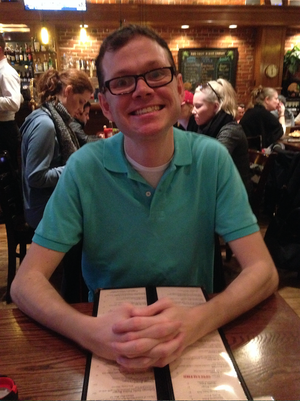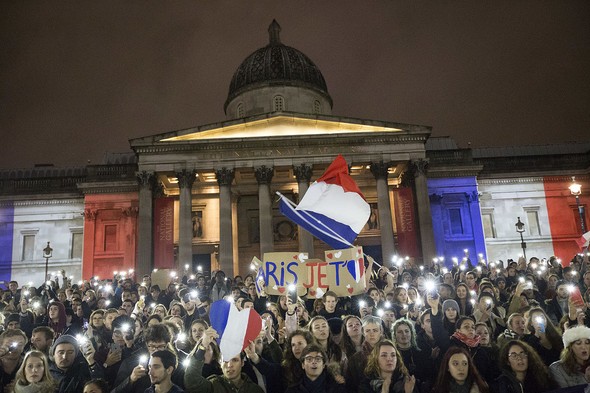One young person’s subversive thoughts on church and society
 Please don’t shame
Please don’t shame
my grief
Reflections on the violence in Paris and Beirut
by Tad Hopp
This weekend, my Facebook and Twitter feeds exploded with prayers, grief, and French flags in the wake of the horrific attacks in Paris that have left at least 129 people dead and many more injured. Quickly some began to ask why other equally tragic incidents of violence weren’t getting as much attention.
“Why aren’t you tweeting about the tragedy in Beirut? You only care about the people in France because they were white! That’s racism.”
“I don’t see people changing their Facebook profile pictures to the Kenyan flag. Is it cause France is a place that more people care about?”
“Why are we getting so worked up about the shootings in France when there are shootings every single day on our own streets that we don’t seem to care about?”
I have seen these comments or similar ones at several points over the last few days. The tragedy in Paris has taken over our Facebook newsfeeds. Similar tragedies have occurred in Beirut and Kenya (though the violence at Garissa University was in April), and while those haven’t gotten nearly as much press (until perhaps recently), they are devastating.
I think it is important to acknowledge that the attacks in Paris, Beirut, Kenya, and anywhere else in the world are equally worthy of attention and news coverage. Any loss of human life is one that we should mourn as a nation and as a world. All deserve to be on the front page of our local paper. And it’s right to ask questions about how privilege, race, and compassion for those who remind us of ourselves inform our disparate responses (see this article about ingroup empathy). Such questions are necessary because if we fail to address inequities in the ways we “feel” about different tragedies, we will surely fail to address inequities in the ways we respond to different tragedies. Paris shocked us because Parisians are not supposed to die in this way. Do we respond less to Beirut because we have come to expect (accept?) the deaths of Lebanese, Syrian, and other Middle Eastern people?
Such questions are important, but not at the expense of people’s genuine grief for Paris. Now is simply the time for sharing our grief, wherever it may fall—Paris or Beirut, or both.
Grief shaming is telling other people whom they should grieve and how they should grieve. It tells others that they aren’t grieving the “right” things.

The National Gallery in London in French colors after the Paris attack (Christiaan Triebert)
Grief can and does take many forms. What one person grieves, another may not. One person may grieve their parent’s death for years, while another may be fine just a few months later. There is no telling what shape any particular person’s grief is going to take. Thus, the very idea that any of us have the right to tell someone how they should be grieving is absolutely outrageous.
A few months ago, I lost someone who had once been a dominant figure in my life. This particular person was one that I hadn’t spoken to in years because of how terribly they had treated me in the past. I had cut ties with this person and hadn’t thought of them in a long time. So when I got the news that they were severely ill and unlikely to last much longer, I was surprised by the depth of emotions I was experiencing. A part of me was somewhat glad they would soon be gone, as it meant that chapter of my life had come to a permanent end. Another part of me was sad that they would be gone, as it meant that I would never get the chance to finally tell them how deeply they had hurt me over the years and perhaps invite this person to ask forgiveness and reconciliation. Another part of me was wondering why in the world I was even the slightest bit sad considering that this was a person who had made my life a nightmare for years. All these emotions were swirling together inside me, and I couldn’t quite figure out how to really respond to the news of their passing.
I write that to show that grief can and does take all kinds of forms and can strike us even when we don’t see it coming. How a person grieves, how long they grieve, and even what specifically they grieve are all a part of their own process. They can mourn the tragedies in Paris or Beirut or Kenya or Chicago, and they don’t need to explain or justify why they are they grieving one tragedy but not all the others.
We can talk about disparate responses eventually; we can parse politics and privilege. But you don’t get to parse my grief. It’s mine.
The church, as an institution, is called to walk with people in all stages of grief. The church is called to minister to people even if we personally disagree with what or how a person is grieving. Grief should be held with grace and care, not with shame. If someone tells you they’re praying for Paris, don’t respond by telling them that they should be praying for Beirut too. That undercuts their grief and comes off as self-righteous. Instead, offer to sit with them during those hard moments and listen to them as they grieve and pray and cry and argue with God about it. And then perhaps suggest a prayer for Beirut also, not as chastisement, but as a natural expression of the pain they’ve expressed. Or just go ahead and express your grief for Beirut. The two need not be in competition.
Yes, we know that other tragedies happened in the world this weekend. We get that. That doesn’t mean, however, that by grieving Paris we are wronging all other people who are hurting. Let people grieve what they need to grieve. Let’s be a little kinder and a little more gracious to each other. Let’s create a world of love, not hate. Not shame. Not anger. Just love. It might just be the only thing that will prevent future tragedies.
Tad Hopp graduated in May 2015 from San Francisco Theological Seminary with a Master of Divinity. He enjoys a good movie, singing karaoke, and anything involving the arts (theater, ballet, opera), and is a self-proclaimed Star Wars, Lord of the Rings, and Harry Potter nerd! He served as a Young Adult Volunteer in Chicago (2010–2011) working with the homeless queer population. He is a lifelong Presbyterian, an ordained ruling elder and deacon, and currently a candidate for ordination.